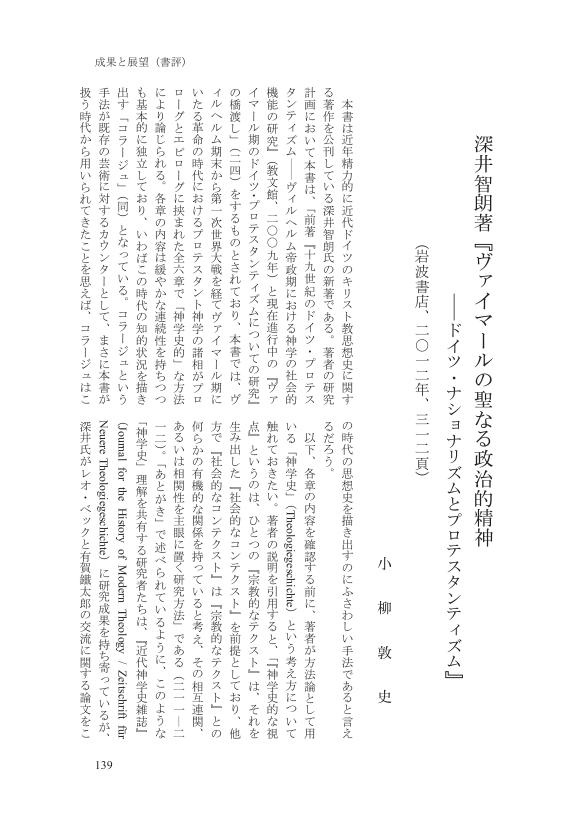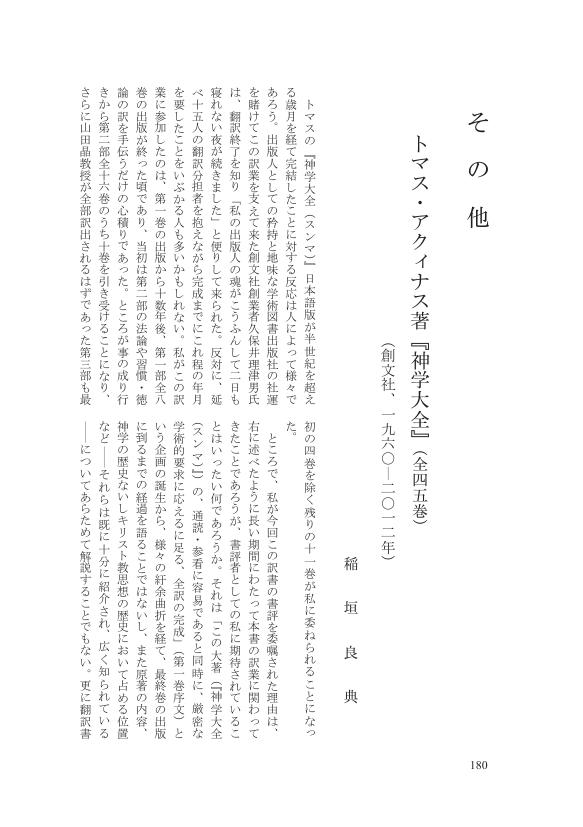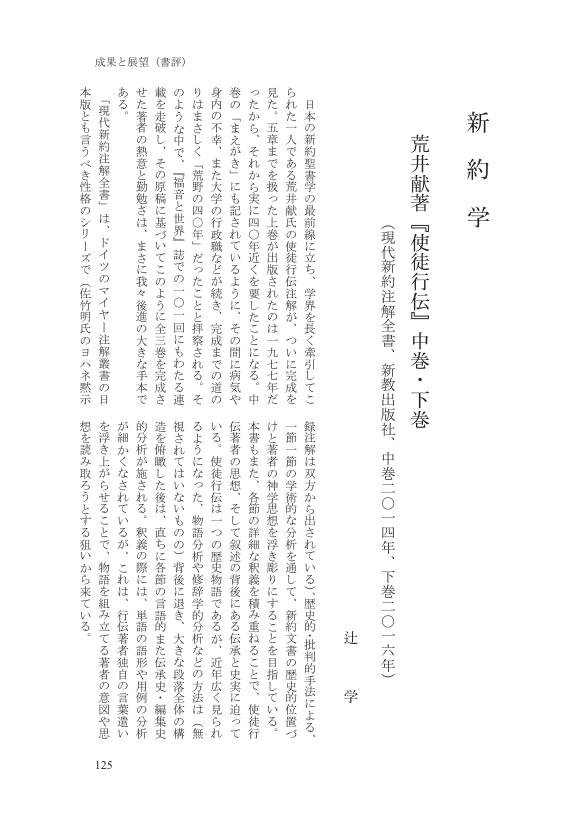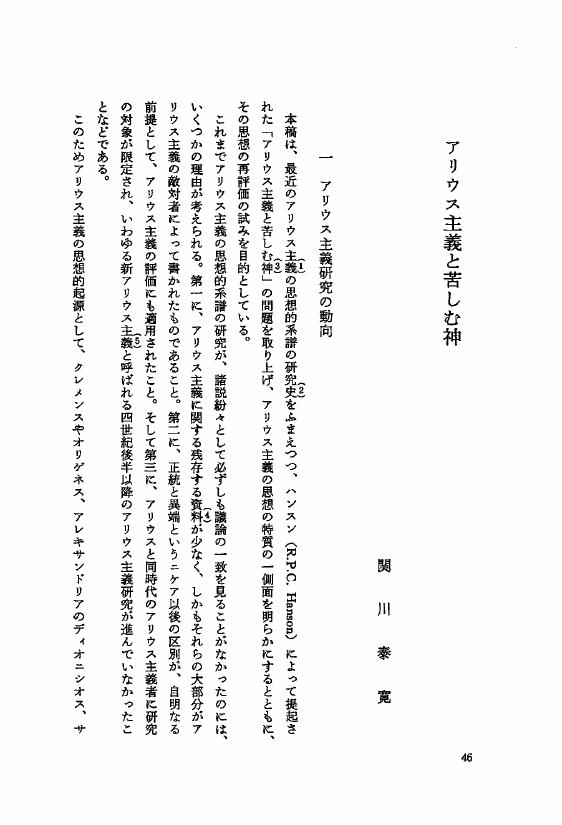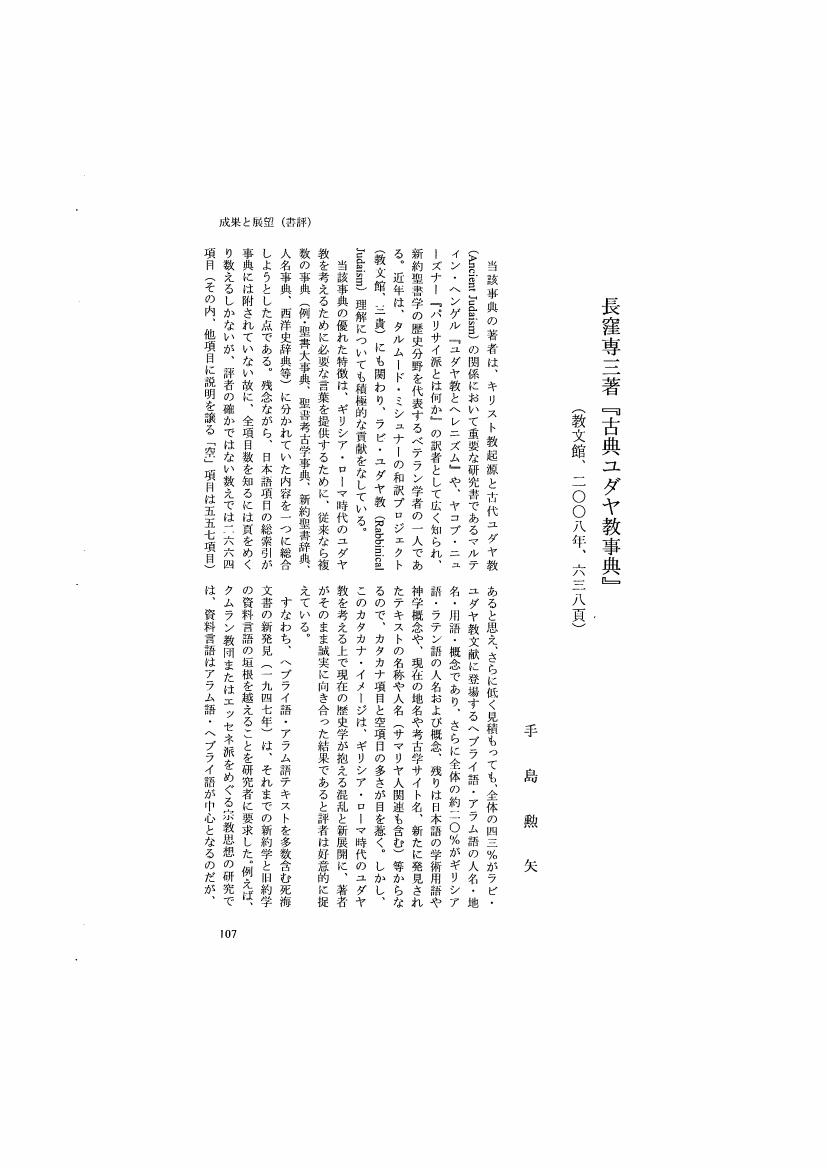- 著者
- 小柳 敦史
- 出版者
- 日本基督教学会
- 雑誌
- 日本の神学 (ISSN:02854848)
- 巻号頁・発行日
- vol.52, pp.139-144, 2013 (Released:2016-02-18)
- 著者
- 小柳 敦史
- 出版者
- 日本基督教学会
- 雑誌
- 日本の神学 (ISSN:02854848)
- 巻号頁・発行日
- vol.52, pp.139-144, 2013
46 0 0 0 OA トマス・アクィナス『神学大全』全四五巻(創文社、一九六〇-二〇一二年)
- 著者
- 稲垣 良典
- 出版者
- 日本基督教学会
- 雑誌
- 日本の神学 (ISSN:02854848)
- 巻号頁・発行日
- vol.52, pp.180-185, 2013 (Released:2016-02-18)
- 著者
- 水谷 誠
- 出版者
- The Japan Society of Christian Studies
- 雑誌
- 日本の神学 (ISSN:02854848)
- 巻号頁・発行日
- vol.49, pp.174-179, 2010-09-17 (Released:2012-01-30)
- 著者
- 水谷 誠
- 出版者
- 日本基督教学会
- 雑誌
- 日本の神学 (ISSN:02854848)
- 巻号頁・発行日
- vol.49, pp.174-179, 2010
- 著者
- 森本 あんり
- 出版者
- 日本基督教学会
- 雑誌
- 日本の神学 (ISSN:02854848)
- 巻号頁・発行日
- vol.2005, no.44, pp.183-188, 2005
- 被引用文献数
- 1
- 著者
- 森本 あんり
- 出版者
- The Japan Society of Christian Studies
- 雑誌
- 日本の神学 (ISSN:02854848)
- 巻号頁・発行日
- vol.2005, no.44, pp.183-188, 2005-09-23 (Released:2009-10-23)
- 被引用文献数
- 1
13 0 0 0 OA 大学闘争とキリスト教
- 著者
- 田川 建三
- 出版者
- The Japan Society of Christian Studies
- 雑誌
- 日本の神学 (ISSN:02854848)
- 巻号頁・発行日
- vol.1970, no.9, pp.40-50, 1970-09-30 (Released:2009-10-23)
- 参考文献数
- 4
- 被引用文献数
- 1
8 0 0 0 OA クィア神学の可能性
- 著者
- 朝香 知己
- 出版者
- 日本基督教学会
- 雑誌
- 日本の神学 (ISSN:02854848)
- 巻号頁・発行日
- vol.50, pp.55-73, 2011-09-06 (Released:2013-05-22)
- 参考文献数
- 6
This article examines the development of “Queer Theology” as a theological response to "Queer Theory." Queer theory focuses on differences among heterosexuals/homosexuals and questions the essentialist idea of sexual identity. It argues against the normativity of heterosexuality and aims to transcend the dualistic thinking of heterosexuality and homosexuality. Thus, queer theology incorporates such features of queer theory into theology. In summary, it is theology practiced by queer Christians, opposing theological heteronormativity and exploring queer things in Christianity. For the debate on homosexuality in Christianity, in a sense, queer theology seems to weaken lesbian/gay liberation based on its view of stable human sexuality owing to Creation by its constructionist position or to result in sexual lawlessness because of its position outside the norm. On the other hand, it warns of idolatry by demonstrating that normalization is always done by humans, reveals that heteronormativity leads to violence such as discrimination or oppression and consequently seems to encourage a more ethical view as a whole.
- 著者
- 辻 学
- 出版者
- 日本基督教学会
- 雑誌
- 日本の神学 (ISSN:02854848)
- 巻号頁・発行日
- vol.57, pp.125-130, 2018-09-25 (Released:2020-06-15)
6 0 0 0 OA 「自分も哲学者に成りたくなつた」 内村鑑三晩年の夢
- 著者
- 関根 清三
- 出版者
- 日本基督教学会
- 雑誌
- 日本の神学 (ISSN:02854848)
- 巻号頁・発行日
- vol.61, pp.9-33, 2022-09-25 (Released:2023-12-07)
6 0 0 0 OA 書評(赤木善光著『宗教改革者の聖餐論』(教文館、二〇〇五年、六二七頁))
- 著者
- 倉松 功
- 出版者
- 日本基督教学会
- 雑誌
- 日本の神学 (ISSN:02854848)
- 巻号頁・発行日
- vol.2006, no.45, pp.149-154, 2006-09-21 (Released:2009-10-23)
5 0 0 0 OA 日本におけるドストエフスキー受容と「研究」
- 著者
- 松本 昌子
- 出版者
- 日本基督教学会
- 雑誌
- 日本の神学 (ISSN:02854848)
- 巻号頁・発行日
- vol.1982, no.21, pp.126-147, 1982-02-28 (Released:2010-05-07)
- 参考文献数
- 26
4 0 0 0 OA アリウス主義と苦しむ神
- 著者
- 関川 泰寛
- 出版者
- The Japan Society of Christian Studies
- 雑誌
- 日本の神学 (ISSN:02854848)
- 巻号頁・発行日
- vol.1991, no.30, pp.46-62, 1991-09-05 (Released:2009-10-23)
- 参考文献数
- 47
- 被引用文献数
- 1
- 著者
- 加藤 喜之
- 出版者
- 日本基督教学会
- 雑誌
- 日本の神学 (ISSN:02854848)
- 巻号頁・発行日
- vol.53, pp.48-69, 2014 (Released:2016-02-25)
The question this paper asks is whether theology can still claim universality. With the rise of multivalent postmodern theologies and of politically-correct mandates in public space, theology as a discipline ceases to make universal claims. However, a series of recent debates between two radically different thinkers brings a renewed philosophico-theological interest in the universal claim of Christianity. The paper focuses on the debate between Hegelian-Lacanian philosopher Slavoj Žižek and Anglican theologian John Milbank in their attempt to articulate the universal claim of Christianity vis-à-vis the domianant global political economy. The first section discusses the ontological and genealogical bases of their understanding of Christian universality. The fundamentally diverse ontologies of void (Žižek) and of peace (Milbank) are situated in the history of theology. The second section examines the role that the representation of Christ plays in Žižek and Milbank's claim of theological universality in relation to the concept of freedom.
4 0 0 0 OA ペラギウス像の再検討
- 著者
- 山田 望
- 出版者
- The Japan Society of Christian Studies
- 雑誌
- 日本の神学 (ISSN:02854848)
- 巻号頁・発行日
- vol.1992, no.31, pp.71-93, 1992-09-05 (Released:2009-10-23)
- 参考文献数
- 66
4 0 0 0 OA 長窪専三著『古典ユダヤ教事典』(教文館、二〇〇八年、六三八頁)
- 著者
- 手島 勲矢
- 出版者
- The Japan Society of Christian Studies
- 雑誌
- 日本の神学 (ISSN:02854848)
- 巻号頁・発行日
- vol.48, pp.107-112, 2009-08-28 (Released:2011-11-09)
3 0 0 0 OA 書評(門脇佳吉著『禅仏教とキリスト教神秘主義』(岩波書店、一九九一年、二七一頁))
- 著者
- 八木 誠一
- 出版者
- 日本基督教学会
- 雑誌
- 日本の神学 (ISSN:02854848)
- 巻号頁・発行日
- vol.1992, no.31, pp.171-176, 1992-09-05 (Released:2009-10-23)
3 0 0 0 OA 「神学とはクィアなもの」? エリザベス・スチュアートの「クィア神学」理解の批判的考察
- 著者
- 工藤 万里江
- 出版者
- 日本基督教学会
- 雑誌
- 日本の神学 (ISSN:02854848)
- 巻号頁・発行日
- vol.57, pp.26-48, 2018-09-25 (Released:2020-06-15)
- 参考文献数
- 16
A British theologian Elizabeth Stuart (1963-) argues that theology is fundamentally “queer” enterprise since Christianity tells us the fact that all socially constructed “identities,” including sexual and gender identities, have no absolute importance. According to Stuart, whereas “gay and lesbian theology” attempts to interrogate theology based on one’s sexual or gender identity, “queer theology” attempts to interrogate the notion of sexuality and gender based on one’s Christian identity. In this paper, Stuart’s understanding of “queer theology” will be explored through an examination of her arguments about baptism, ecclesiology, and eschatology. I will also analyze her use of the term “queer” as well as the term “theology” and clarify some issues inherent in her understanding of “queer theology.”
3 0 0 0 シモーヌ・ヴェイユの祈り:共苦の源泉へ
- 著者
- 松原 詩乃
- 出版者
- The Japan Society of Christian Studies
- 雑誌
- 日本の神学 (ISSN:02854848)
- 巻号頁・発行日
- no.41, pp.7-26, 2002
